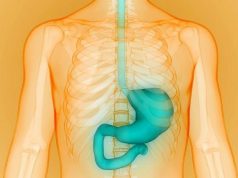The American College of Gastroenterology’s 82nd Annual Scientific Meeting
The annual meeting of the American College of Gastroenterology was held from Oct. 13 to 18 in Orlando, Florida, and attracted approximately 5,000 participants from around the world, including gastroenterology and digestive specialists and other health care professionals. The conference featured presentations on clinical updates in gastroenterology and hepatology as well as the latest advances in digestive health and gastrointestinal disorders.
In one study, Elizabeth S. John, M.D., of Robert Wood Johnson Medical School at Rutgers University in New Brunswick, New Jersey, and colleagues found that patients being prescribed opioids who also have Clostridium difficile infections (CDIs) have higher peak white blood cell counts, higher creatinine elevations, longer lengths of stay, and worse mortality.
“Also, with 31 percent of patients being on opioids before hospitalization and 66 percent of patients being on opioids during hospitalization, we as practitioners have to assess our prescribing patterns. As practitioners, we should be cognizant of this relationship between opioid use and more severe CDI,” said John. “In terms of clinical practice, I think the most important part is identifying opioids as a risk factor for a more severe course of CDI. If patients with CDI are not improving and are on opioids, physicians should think about tapering down the opioids.”
Abstract No. 103
In another study, John and colleagues found that women remain underrepresented within gastroenterology.
“At the level of assistant professor, females have a lower h-index, which is a reflection of their research productivity. This appropriately reflects the underrepresentation of females at this level of rank,” John said. “However, in the next two levels, associate professor and full professor, despite having similar h-indexes, females are still underrepresented. This highlights the continued underrepresentation of females at these levels.”
The investigators also found that at the level of chair, the h-index of females was significantly lower than that of males.
“This was an interesting finding, as becoming chief or chair of a department oftentimes corresponds to one’s research productivity,” said John. “Females have been known to possess different qualities than males in the workplace, such as their holistic views of problems. Perhaps other qualities besides research productivity are becoming more recognized as vital in roles of leadership.”
Abstract No. 329
Anas Raed, M.D., of Augusta University in Georgia, and colleagues found that among patients who were diagnosed with colorectal cancer (CRC) when younger than 50 years, the incidence rate has increased in females more than males and Caucasians have a higher incidence rate than other races. In addition, the investigators found that there was an increase in the CRC incidence rate in all colon segments, particularly in the right colon and rectum.
“CRC is not only a disease of the elderly but also is catching up among the people younger than 50 years. Trends in CRC are increasing among this young population, especially among the Caucasian females,” said Raed. “In terms of location of the primary tumor, the ascending colon has the highest incidence rate followed by rectosigmoid, rectum, and then descending colon. Therefore, majority of the colon segments need attention, which emphasizes the need for colonoscopy over sigmoidoscopy.”
Abstract No. 193
In a meta-analysis of 10 observational studies, Sakolwan Suchartlikitwong, M.D., of Texas Tech University Health Sciences Center in Lubbock, and colleagues found a significant association between statin use and a reduced risk of CDI development.
“The association between statin use and a reduced risk of CDI infection might impact the primary prevention and clinical management of CDI diarrhea. However, this study has a limitation,” Suchartlikitwong said. “Studies that were included in our analysis were observational studies. Further randomized controlled study to investigate this association is also suggested.”
Abstract No. 1805
ACG: Diphenhydramine Ups Sedation in Chronic Opioid Users
MONDAY, Oct. 16, 2017 (HealthDay News) — For patients using chronic opioids, use of diphenhydramine in addition to conventional sedatives appears to decrease pain and is associated with improved sedation during colonoscopy, according to a study presented at the World Congress of Gastroenterology, being held in partnership with the American College of Gastroenterology’s annual scientific meeting and postgraduate course Oct. 13 to 18 in Orlando, Florida.
ACG: Burnout Reported by About Half of Gastroenterologists
MONDAY, Oct. 16, 2017 (HealthDay News) — Almost half of gastroenterologists report burnout, with lifestyle or work-life balance factors frequently associated with burnout, according to a study presented at the World Congress of Gastroenterology, being held in partnership with the American College of Gastroenterology’s annual scientific meeting and postgraduate course Oct. 13 to 18 in Orlando, Florida.
ACG: Defecation Posture Modification Device Beneficial
MONDAY, Oct. 16, 2017 (HealthDay News) — A defecation posture modification device (DPMD) can reduce bowel movement duration and straining patterns among healthy individuals, according to a study presented at the World Congress of Gastroenterology, being held in partnership with the American College of Gastroenterology’s annual scientific meeting and postgraduate course Oct. 13 to 18 in Orlando, Florida.
ACG: Fecal Transplant Safe in Primary Sclerosing Cholangitis
MONDAY, Oct. 16, 2017 (HealthDay News) — Fecal microbiota transplantation (FMT) from a rationally selected donor seems safe and effective for patients with primary sclerosing cholangitis (PSC), according to a study presented at the World Congress of Gastroenterology, being held in partnership with the American College of Gastroenterology’s annual scientific meeting and postgraduate course Oct. 13 to 18 in Orlando, Florida.
Copyright © 2017 HealthDay. All rights reserved.







